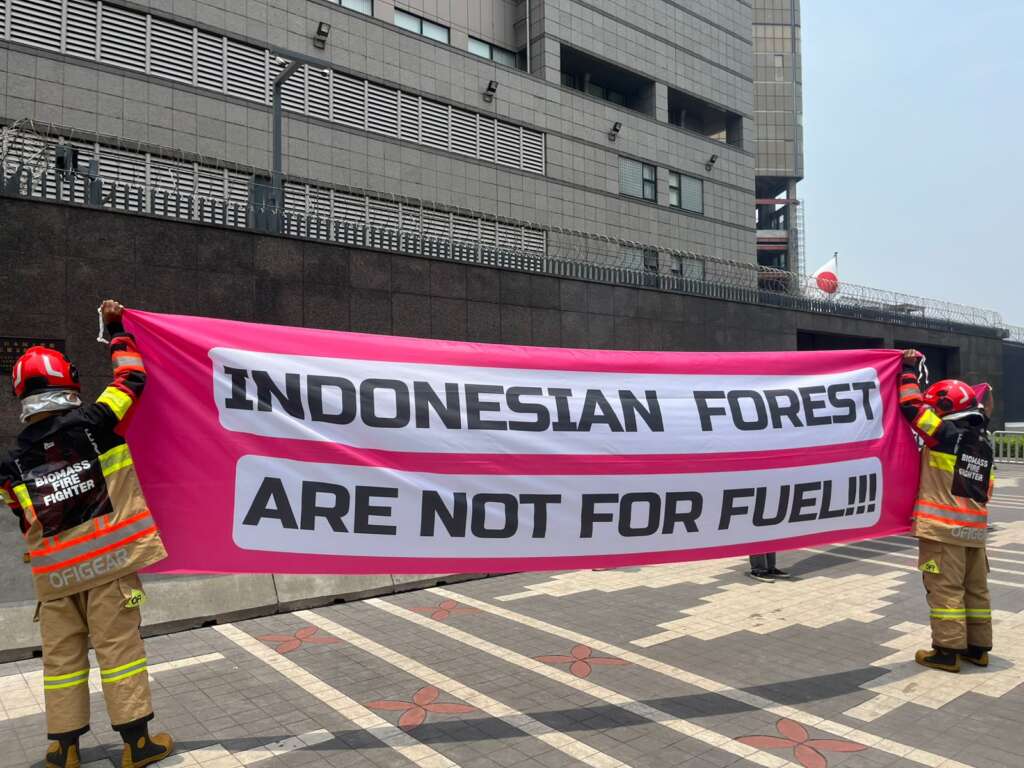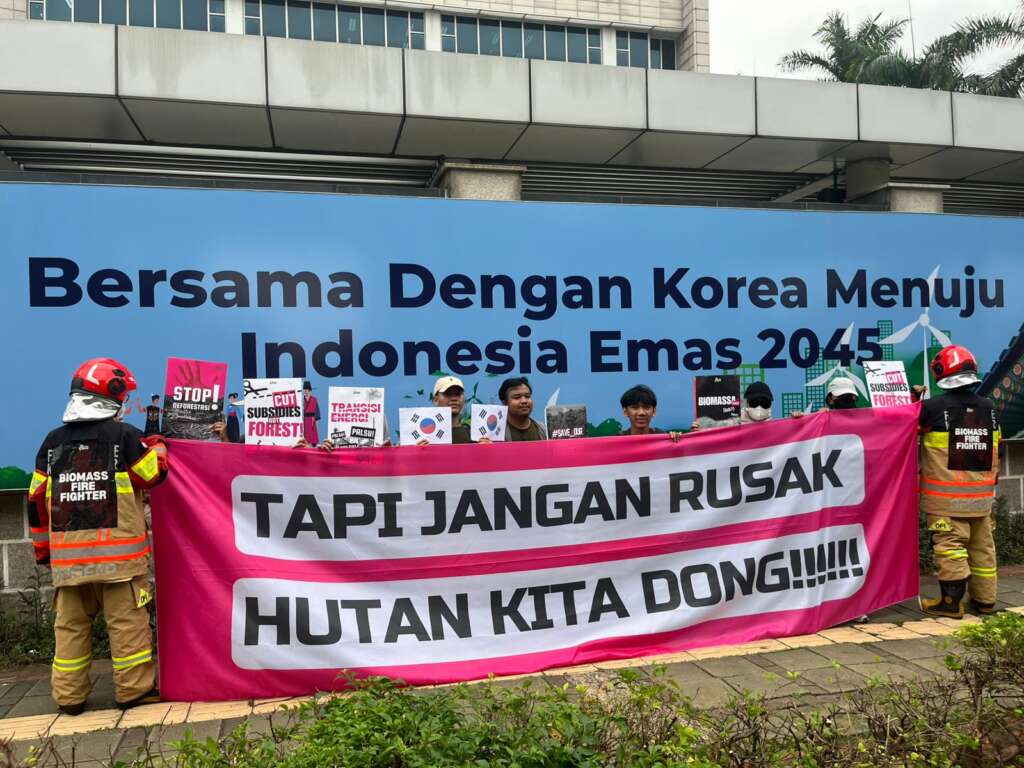
Jakarta, October 20, 2025 – Today, October 20, 2025, environmental activists from civil society organizations held a peaceful demonstration in front of the Japanese and South Korean embassies in Jakarta. The demonstration highlighted the serious impact of wood pellet imports from Indonesia to Japan and South Korea, which are considered to accelerate deforestation, damage natural forests, and contradict the principles of climate justice.
“Indonesia’s forests are not your fuel, Japanese and Korean citizens. Stop importing wood pellets from Indonesia and stop destroying forests in Indonesia,” said Tsabit Khairul Auni, Action Coordinator of Forest Watch Indonesia (FWI), during a protest in front of the Japanese Embassy on Jl. MH Thamrin, Jakarta, on October 20, 2025.
Over the past five years, Japan and South Korea have been aggressively importing wood pellets from Southeast Asia, including Indonesia, as part of the two developed countries’ energy transition strategies. This has put tremendous pressure on Indonesia’s forests and exacerbated deforestation, forest degradation, and large-scale carbon emissions.
As the third-largest forest in the world and a region spanning three time zones with the richest biodiversity on Earth, Indonesia’s forests cannot and should not be exploited to meet the surge in biomass demand. At least 40 million hectares of natural forest are threatened by various projects. “The use of biomass wood pellets by Japan and South Korea sourced from Indonesia goes against the principles of a just energy transition,” he said.
One example of suspected illegal wood pellet imports was caught by the Indonesian Maritime Security Agency in August 2024. Initial investigations revealed that the MV Lakas was a Philippine-flagged vessel carrying 10,545 metric tons of wood pellets without several important documents, such as a Certificate of Analysis, Certificate of Origin, and Certificate of Shipper Declaration, which are required for the transport of dangerous goods under the IMSBC. The arrest was made based on a report from Forest Watch Indonesia (FWI) and was followed up by the Central Bakamla Zone in collaboration with the Gorontalo Naval Base and supported by the Gorontalo community.
Tsabit said that the action was a strong warning to both countries for contributing to the destruction of Indonesia’s remaining natural forests. Since the 1980s, Indonesia and Japan have been collaborating on biomass projects. In 2020, the Ministry of Energy and Mineral Resources and PLN launched a biomass co-firing plan at 52 coal-fired power plants.
One Japanese industry, Mitsubishi Heavy Industries, signed an MoU and conducted a feasibility study on co-firing in Indonesia. Japan and the United States have also formed the Just Energy Transition Partnership (JETP) to mobilize USD 20 billion in public and private funds, with a target of 5–10% coal co-firing by 2030–2050. The Japan Bank for International Cooperation (JBIC) and Nippon Export and Investment Insurance (NEXI) are providing financial support for PLN’s co-firing protocol.
In addition, Sumitomo Heavy Industries (SHI) and Ishikawajima-Harima Heavy Industries (IHI) have promoted biomass co-firing in power plants. An agreement has been reached to import hundreds of thousands of tons of biomass from Indonesia to Japan, worth trillions of rupiah. Japanese investor Tokuyama Industry has also examined the infrastructure readiness in Mukomuko, Bengkulu, for the construction of a biomass power plant. Vietnam, Thailand, and Cambodia are also experiencing a similar fate.

The results of the FWI team’s investigation show that more than 80% of wood pellet imports by these two countries originate from deforestation of natural forests. Not from rehabilitation,” said Anggi Putra Prayoga, FWI Campaign Officer.
“Indonesia, along with Japan and South Korea, must exclude biomass (wood pellets and other processed wood derivatives) from their energy transition strategies and climate agendas. This practice is unfair because in importing countries, emissions are counted as zero or close to zero. Meanwhile, in producing countries such as Indonesia, they become a source of emissions in the forestry and land use sectors because they originate from deforestation,” added Anggi.
Similar protests were also held on a massive scale in other countries such as Europe, East Asia, Latin America, Oceania, and Asia Pacific. Coinciding with the International Day of Action Biomass on October 21st, civil society organizations affiliated with the Biomass Action Network (BAN) alliance called for an end to the destruction of forests in the name of energy and climate transition.
This action is part of a global solidarity movement, in which communities in various countries are speaking out against policies on the use of biomass-based energy. By standing in front of the Japanese and South Korean embassies, the activists want to emphasize that Japan and South Korea are in the global spotlight.
“This campaign is supported by a global community that agrees to reject the burning of biomass, which is claimed to be a renewable energy source. The global call is to revoke biomass subsidies and implement a just energy transition,” added Satrio Manggala from the Biomass Action Network.

Environmental activists from the Environmental Paper Network are calling for three key actions:
- The governments of Japan and South Korea to stop importing wood pellets from Indonesia that destroy forests and violate principles of justice. They should also revoke subsidies for biomass-based energy.
- The Ministry of Energy and Mineral Resources (ESDM) and the Ministry of Forestry to immediately remove biomass from the emissions reduction framework and energy transition agenda.
- To the international public, do not be caught up in the false narrative that wood biomass is green energy; support a just and sustainable energy transition. Without sacrificing natural forests and local communities (indigenous and local communities).
Satrio emphasized that the use of wood pellets in Japan and South Korea is not a clean energy solution, but rather a form of climate colonialism disguised as energy transition that sacrifices Indonesia’s forests. “We demand that both countries immediately stop this practice and switch to truly clean renewable energy, abandoning coal and not destroying ecosystems anywhere on earth,” Satrio said.
He emphasized that Japan and South Korea have claimed that their emission reduction targets have been achieved. But it must be remembered that the climate crisis is a global issue, so the impact of the destruction of Indonesia’s forests will actually worsen the global climate. “This is a serious problem. Countries must really think about the right way to deal with it. And if biomass is still being used as an energy source, then we are plunging into the abyss of a climate crisis that is becoming increasingly real,” concluded Satrio.
media contacts:
Alvin/FWI/+62 857-2034-6154/alvin@fwi.or.id



